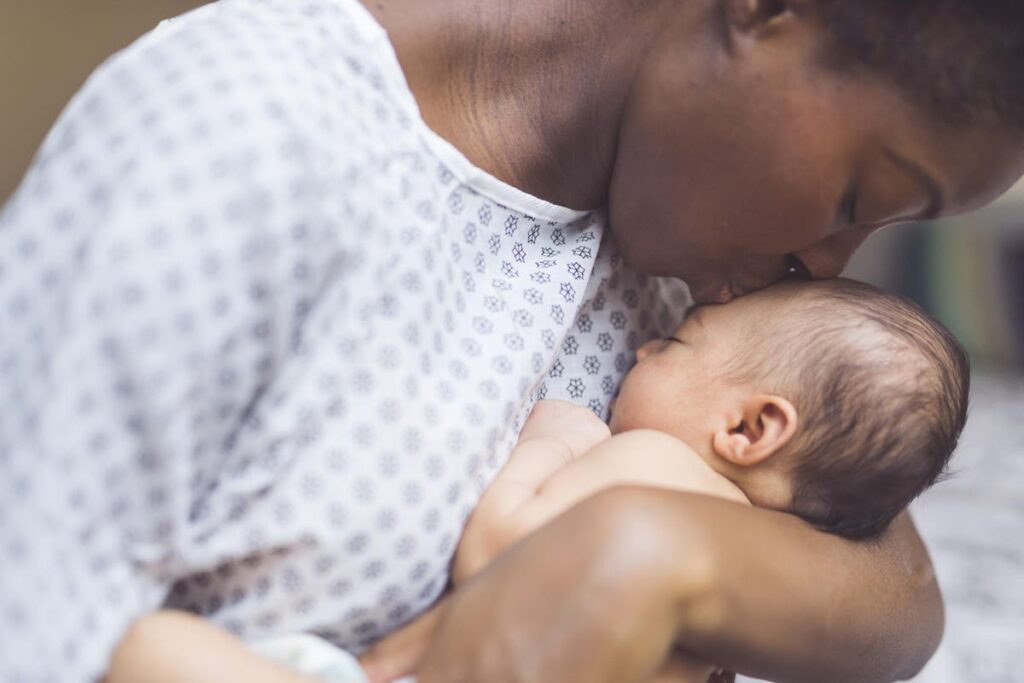A young mother in a hospital gown holds her infant in her arms. The baby’s eyes are closed.
An investigation into maternity care failings at a hospital trust in central England will be largest review of its kind in the country.
Some 1,700 cases at Nottingham University Hospitals Trust will be examined by an expert midwife in an independent review backed by England’s public health system, the National Health Service (NHS).
It’s possible this number could grow even further, as families can still contact investigators to take part.
A previous investigation by Channel 4 News and the Independent found 80 cases of permanent brain damage, still-birth or neonatal death among babies delivered at the organisation between 2010 and 2020.
First launched in September, affected families were initially invited to take part in the current review through an “opt-in” consent process. But concerns, including a lack of engagement with ethnic minority families, has led to a change of approach.
Now families will be given the option of “opting out” of the review. It’s hoped this will ensure better representation of the communities the trust serves.
In the U.K, women from Black, Asian and mixed ethnic backgrounds are far more likely to die within six weeks of giving birth than white women. They are also more likely to lose their babies in childbirth or shortly after.
Despite this, government recently rejected a recommendation from ministers on its own Women and Equalities Committee to set a target to end racial disparities in maternal deaths.
‘Conducted with kindness’
Senior midwife Donna Ockendon —who is leading the NHS-backed investigation — told a meeting at the trust on Monday that she had already spoken with families “struggling to provide 24-hour care” for brain-damaged babies, as well as those who have lost their children.
“I have spoken to a mother whose baby is so poorly, she asked herself on a regular basis, would it be better if my baby had passed away?” Ockendon told the public meeting.
“I know there are families who never brought their baby home, or babies who did come home who died very shortly afterwards and I know that there are little boys and girls out there in Nottinghamshire today, without their mummies, as we all celebrate to the end of the school year. I know that there are women living with life-changing harm,” she added. “And how do I know that this is true? Because I have met those families.”
She promised families that her review “will be conducted with kindness, with compassion, with expertise, and professionalism.”
Trust chair Nick Carver told the meeting that his organisation had “failed the families and communities” that it serves.
“On behalf of the trust board, I commit the trust to a new honest and transparent relationship with the families whose lives have been affected by maternity failings at the trust,” he added. “For too long we have failed to listen to women and families who have been affected by failings in our maternity services. This ‘brick wall’ has caused additional pain, and this must change.”
This is the latest in a string of major reviews into maternity care in England.
Ockendon, for example, previously led a landmark investigation of nearly 1,500 maternity cases at the Shrewsbury and Telford Hospital Trust in western England between 2000 and 2019. Her review found some 300 babies had been injured or had died following care failings.
Recurrent themes in the investigation — as well as two more performed by Dr Bill Kirkup — include problems with workforce culture, a failure to listen to families, delays escalating deliveries to caesarean section and poor communication between physicians and midwives.
In the U.K., midwives are a key component in maternity care and regularly lead deliveries. They must train for at least three years and attain a degree-level qualification to practice in public hospitals.
Despite investigations like Ockendon’s and Kirkup’s, the U.K. continues to outperform the U.S. on several measures of maternal safety. It has a far lower maternal mortality rate than the U.S., for example — but this figure has risen in recent years.


